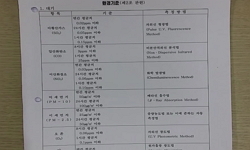Realizing common prosperity is the ultimate wish of all Chinese people. In recent years, as rural areas have shifted their focus towards digital development, rural industries have embraced e-commerce, effectively harnessing the power of "e-commerce" t...
http://chineseinput.net/에서 pinyin(병음)방식으로 중국어를 변환할 수 있습니다.
변환된 중국어를 복사하여 사용하시면 됩니다.
- 中文 을 입력하시려면 zhongwen을 입력하시고 space를누르시면됩니다.
- 北京 을 입력하시려면 beijing을 입력하시고 space를 누르시면 됩니다.

The Impact of Rural E-commerce on the Common Prosperity of Residents: An Empirical Analysis Based on Micro Data in China
한글로보기https://www.riss.kr/link?id=A109029495
-
저자
Cheng, Jiayun (School of Economics and Management, Zhejiang Normal University, China) ; Ma, Xingchao (School of Economics and Management, Zhejiang Normal University, China)
- 발행기관
- 학술지명
- 권호사항
-
발행연도
2024
-
작성언어
English
- 주제어
-
등재정보
KCI등재
-
자료형태
학술저널
-
수록면
81-109(29쪽)
- DOI식별코드
- 제공처
-
0
상세조회 -
0
다운로드
부가정보
다국어 초록 (Multilingual Abstract)
Realizing common prosperity is the ultimate wish of all Chinese people. In recent years, as rural areas have shifted their focus towards digital development, rural industries have embraced e-commerce, effectively harnessing the power of "e-commerce" to propel common prosperity. In China, Zhejiang Province, as a national model area for common prosperity, has provided valuable experience for the whole country by combining digital reform and common prosperity. The development of rural e-commerce has not only significantly increased the income of residents, but also driven the prosperity of the rural economy. However, to promote common prosperity with digital reform, it is not enough to raise residents' material affluence. While pursuing material affluence, we should also pay attention to spiritual affluence. In order to explore the influencing factors and mechanism of rural e-commerce on residents' common prosperity, this paper is based on the micro-sample survey data of 192 Taobao villages in Zhejiang Province, China, and organically combines quantitative research methods, such as multiple regression analysis, heterogeneity test, robustness test, mediation effect model, regulatory effect model, and qualitative methods, such as interview, questionnaire, and empirical generalization, with cross-validation. The results of the study show that: ①rural e-commerce has a significant positive effect on residents' material affluence, spiritual affluence and ecological affluence; ②material affluence and ecological affluence are the main factors that rural e-commerce promotes the transmission path of spiritual affluence; ③entrepreneurship, social capital and financial literacy play a significant positive regulatory role between rural e-commerce and material affluence; ④career identity plays a positive regulatory role and unequal opportunities plays a negative regulatory role between rural e-commerce and spiritual affluence respectively. This research offers valuable insights for future rural development decisions, serving as a valuable reference for other regions' rural development efforts. Moreover, it offers inspiration and a practical path for achieving comprehensive well-being in the new era.
동일학술지(권/호) 다른 논문
-
- 부산대학교 중국연구소
- YANG JINGJING
- 2024
- KCI등재
-
中国居民性别、心理健康状况与心理健康知能的相互关系研究——基于CGSS调查数据
- 부산대학교 중국연구소
- 周洁
- 2024
- KCI등재
-
- 부산대학교 중국연구소
- Chen, Sisi
- 2024
- KCI등재
-
新媒体环境下高等院校基于微信公众号开展就业指导的路径探究——以通化师范学院为例
- 부산대학교 중국연구소
- 兰怀昊
- 2024
- KCI등재




 eArticle
eArticle


